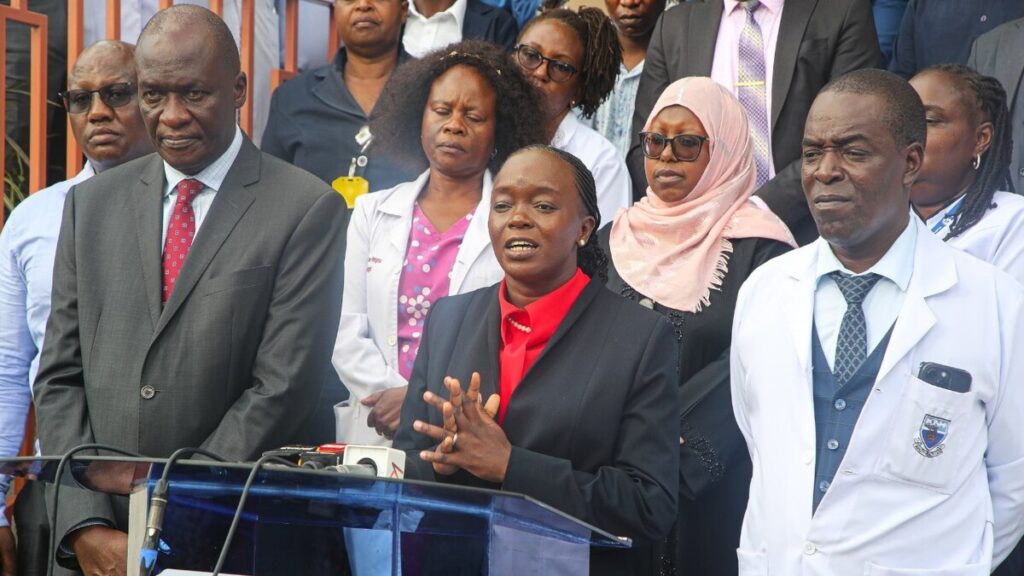Health Cabinet Secretary Deborah Barasa has strongly defended the government against recent criticism from Catholic bishops. She addressed concerns about the state of Kenya’s health and education sectors.
The response comes after the Kenya Conference of Catholic Bishops (KCCB) raised serious concerns. They highlighted unpaid National Health Insurance Fund (NHIF) debts to Catholic hospitals.

Health CS Deborah Barasa (centre) speaks at Kenyatta National Hospital on November 4, 2024, where she assessed the facility’s performance under SHA. (Photo: Ministry of Health)
According to the KCCB, Catholic healthcare facilities are owed approximately Ksh 2.5 billion. These outstanding payments have strained the operation of many church-run hospitals.
CS Barasa has now promised swift action to address this financial crisis. She assured that the government would settle all NHIF arrears within the next week.
The Catholic Church operates an extensive network of healthcare facilities across Kenya. This includes 69 hospitals, 117 health centres, and 251 dispensaries nationwide.
These church-run facilities play a crucial role in Kenya’s healthcare system. They provide essential medical services to millions of citizens, especially in remote areas.
However, the relationship between the government and religious healthcare providers has become strained. The Catholic Church recently accused the Kenya Kwanza administration of implementing unfavourable policies.
Church leaders claim these policies aim to weaken their role in society. They specifically pointed to changes affecting their healthcare and education institutions.
The situation prompted President William Ruto to meet with Catholic bishops. This meeting followed their protest over recent policy shifts affecting church-run institutions.
During their criticism, the KCCB highlighted broader challenges facing ordinary Kenyans. They pointed to increasing difficulties in accessing both education and healthcare services.
The bishops expressed particular concern about the impact on vulnerable communities. They argued that government policies have made essential services less accessible.
CS Barasa’s response aims to address these concerns and restore confidence. She emphasised the government’s commitment to supporting faith-based healthcare providers.
The Health Ministry has outlined plans to strengthen cooperation with religious institutions. This includes ensuring timely payments and better coordination of healthcare services.
The KCCB’s criticism reflects growing tensions in Kenya’s social services sector. It highlights the complex relationship between state institutions and religious service providers.
Catholic health facilities serve a significant portion of Kenya’s population. Their role becomes even more crucial in areas where government facilities are limited.
The current dispute has raised questions about healthcare financing in Kenya. It highlights challenges in maintaining effective partnerships between government and religious institutions.
Healthcare experts note that resolving these issues is crucial for public health. They emphasise the importance of maintaining strong relationships with faith-based healthcare providers.
The government’s promise to clear NHIF arrears marks an important step. However, stakeholders await concrete action to address broader concerns in the health sector.
Educational institutions run by the Catholic Church face similar challenges. The bishops have called for comprehensive dialogue on policies affecting church-run schools.
President Ruto’s meeting with the bishops signals recognition of these concerns. It suggests potential for improved cooperation between government and religious institutions.
The outcome of this situation could influence future healthcare delivery in Kenya. It may reshape the partnership between government and faith-based organisations.
Stakeholders in both health and education sectors watch these developments closely. They hope for solutions that benefit all Kenyans seeking essential services.
The government’s response to these challenges will be crucial. It must balance public sector reforms with the valuable role of religious institutions.
As the situation unfolds, many hope for stronger collaboration between all parties. This cooperation is essential for improving healthcare and education access in Kenya.



















